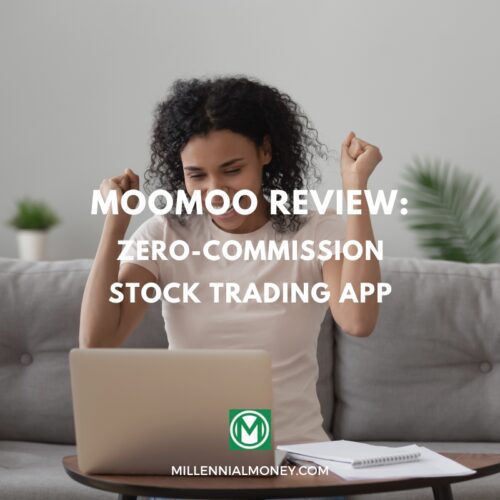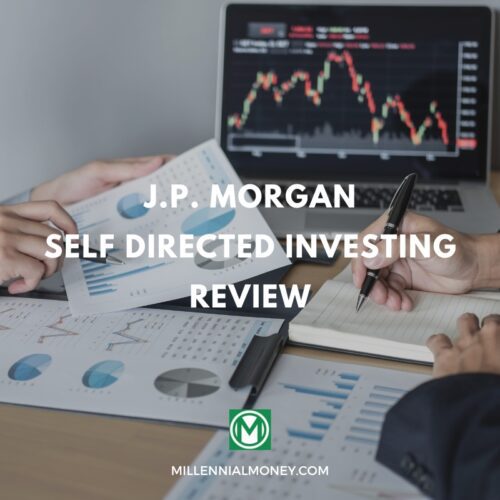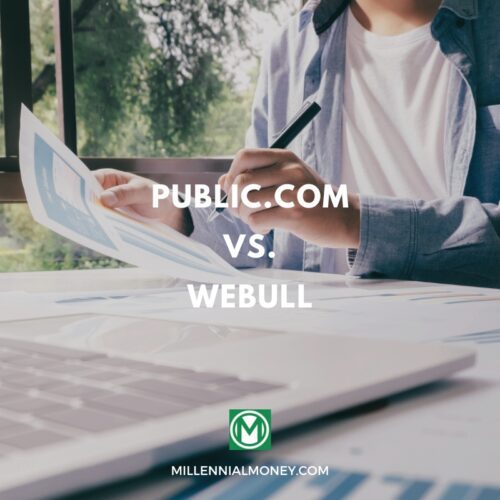If you’re looking for low-cost investing, Robinhood and Vanguard are two of the most widely used platforms on the market. One has been around for decades, the other is a relatively recent product of the internet. One might be viewed as staid and steady, the other could be thought of as a bit of a rebel.
When it comes to any online service, it’s not a matter of saying that one is better than the other. The right selection largely depends on your needs as an investor. Robinhood and Vanguard are very different platforms, offering unique features for investors.
Which one is better for you and your investing needs? Keep reading for a rundown of each platform and to find out how they stack up against each other.
Robinhood vs. Vanguard: An Overview
Robinhood
Robinhood is a web-based platform and mobile app that you can use to trade stocks, exchange-traded funds (ETFs), options, and even cryptocurrencies like Bitcoin and Ethereum.
The company is known for its free stock promotion. When you sign up for their service, you’ll get a free share of stock worth up to $200. In addition, Robinhood offers a recurring investments feature that you can use to automatically fund your accounts and grow your investments over time — a great feature for active traders.
Robinhood made a name for itself following its launch in 2013 with a groundbreaking approach to trading that enabled free trading and no account minimums, putting pressure on other companies to do the same. The company played a significant role in democratizing investing, and it was rewarded by becoming immensely popular with millennials who used the platform to learn the stock market.
Robinhood has since become embroiled in controversy (more on that below), yet the service still remains a popular investment platform among investors young and old.
Robinhood Pros
- Free stock
- Recurring investments
- Commission-free trading
- Cryptocurrency
- Broad market exposure
Robinhood Cons
- Limited trading platform
- Poor customer service
- Minimal research capabilities
- Beginner platform — not for experienced users
Vanguard
With a launch date back in 1975, Vanguard is old enough to be Robinhood‘s parent. Much like Robinhood, the company was created to be a revolutionary platform for investors. The brainchild of founder John Bogle, Vanguard was built to be a client-owned mutual fund company with no external owners.
By taking this approach, Vanguard has been able to offer low-cost investing and advocacy services for investors for decades, similarly pressuring others in the industry to follow suit toward making investing available to more people. Today, the company remains one of the most trusted and affordable providers of individual stocks, mutual funds, index funds, retirement accounts, and education accounts.
Over the years, Vanguard has evolved into a leading online investment provider. Today, the company offers a powerful website and mobile app filled with robust brokerage services for long-term investors.
Vanguard Pros
- Low-cost investment options
- Robust research tools and customer support
- Certain mutual funds and ETFs are free
- Trusted reputation — Vanguard has been around since 1975
Vanguard Cons
- No extended-hours trading
- No foreign exchange market (FOREX)
- No cryptocurrency
- Fees on certain accounts and investments
How Robinhood Compares to Vanguard
Now that you have a basic understanding of the platforms, let’s take a look at a detailed breakdown of how Robinhood’s services compare with Vanguard’s.
Costs and Fees
Account Minimums
Robinhood and Vanguard both provide $0 account minimums, so you won’t have to worry about keeping a base level of capital in your account with either service. This is useful for beginner investors who don’t have a lot of money to put into either platform, or for those who just want to explore.
To fund either account, simply connect your bank account to the platform and send money over.
Commissions
Both companies also offer $0 commissions for stock trades, ETFs, and options. In other words, you don’t have to pay transaction fees when you buy or sell most securities. Your money will go toward growth instead of paying for management services.
Robinhood was one of the first companies to offer commission-free trading, and at the time it was a big deal. However, today commission-free trading is a common option that you will find at most leading investment firms — including E*TRADE, M1 Finance, and Webull.
Maintenance
Vanguard charges a number of maintenance fees that are assessed based on your account type. For example, you’ll pay Vanguard an annual $20 maintenance fee for each online brokerage account if you have less than $10,000 in total assets in the account.
For mutual-fund only accounts, Vanguard also assesses a $20 annual fee with account balances south of $10,000.
Simple IRAs are assessed at $25 annually for each mutual fund in each account, while 403(b) plans and individual 401(k) and individual Roth 401(k) plans are assessed at $5 per month per participant, and $20 for each Vanguard mutual fund in each account, respectively.
Vanguard offers a variety of maintenance fee waivers, which you can learn more about on their website.
Robinhood, on the other hand, does not charge any maintenance fees to open, close, or maintain a brokerage account.
Broker-Assisted Trades
A broker-assisted trade is one where a human representative makes a trade on your behalf instead of you executing it yourself. This is useful for times when you don’t have internet or mobile access but you still want to remain active in the market.
Vanguard charges for broker-assisted trades, at a rate between $0 and $25, depending on how much you have in your account. A sliding fee of $0 to $50 for brokerage-assisted mutual funds is also applied.
Robinhood does not offer broker-assisted trades.
Online Trading Experience
Robinhood offers a user-friendly platform that is designed to make trading simple and easy for investors over a web or mobile interface. However, the platform is barebones. If you’re looking for advanced analytics and charting tools for research purposes, you’ll have to look outside of the app. The platform is somewhat limited.
Vanguard is not known for its trading platform. The platform offers a reliable way to place trades, but that’s about it. If you’re looking for an advanced user experience with professional-grade tools and features, you may want to look to a competing service like Fidelity or Schwab.
Mutual Funds
If you’re looking for mutual funds, you’ll have to look beyond Robinhood because the platform does not offer mutual funds. This is where Vanguard can provide a major edge.
Vanguard offers a wide range of no-load/no-fee mutual funds. If you’re looking to invest in a large basket of companies through mutual funds, Vanguard provides one of the most competitive offerings in the industry.
Retirement Funds
Retirement planning is another area where Robinhood falls short, as the company does not offer retirement funds like IRAs or Roth IRAs.
On the other hand, Vanguard offers a variety of customizable retirement plans and tools to help you get ahead for your golden years. The company also offers a robo advisor that you can use for automated assistance.
Security
Both Vanguard and Robinhood offer robust security features. For example, Vanguard lets you log into your app with facial recognition software. In addition, the company offers excess Securities Investor Protection Corporation (SIPC) insurance.
Robinhood does not offer excess SIPC insurance, but the company offers cash and securities protection through the SIPC.
In short, while neither platform is truly safe from cybercrime — and Robinhood recently faced a lawsuit stemming from a breached account — both Robinhood and Vanguard offer advanced security measures to prevent unauthorized intruders from accessing your information.
Reputation
This is another area where Vanguard shines compared to Robinhood. Vanguard, which has been around for a few decades longer than Robinhood, has a stellar reputation among investors for offering below-average expense ratios, a wide range of offerings, and strong customer service.
Robinhood, however, was recently hit with a $65 million federal class-action lawsuit alleging that the company failed to inform clients that stock orders were being sold to trading institutions, in effect misleading them about how they make revenue from trades.
So, if you’re looking for a platform based on reputation and trustworthiness, the safer bet is to go with Vanguard based on Robinhood’s recent tribulations.
Target Users
Robinhood’s platform is ideal for beginner to intermediate investors who are looking for a user-friendly and convenient way to trade online or on the go. Robinhood is better for trading small amounts at a time and for learning more about how the market works.
Vanguard can be used by beginner, intermediate, or highly advanced users. While the platform is less flashy than Robinhood, Vanguard offers certain financial products that simply can’t be beaten on the market.
Vanguard is one of the most competitive solutions you’ll find for affordable funds. Use the company if you are more concerned about diversifying your portfolio, asset allocation, and accessing affordable investments than learning and dabbling.
Frequently Asked Questions
Does Robinhood offer cryptocurrency?
Robinhood now lets you trade a variety of cryptocurrencies — including Bitcoin, Dogecoin, Ethereum, and a variety of others — and you can trade them around the clock.
One of the nice features of Robinhood is that you won’t pay commission on your cryptocurrency trades, meaning all of your investment goes toward the asset. This is not the case with all cryptocurrency platforms on the market, including Coinbase.
Here is a disclaimer: Despite what you see on the news about Bitcoin’s growth, cryptocurrency is extremely volatile. If you want to explore this market, make sure to thoroughly research and understand the risks of tying up your money with tokens.
Is Robinhood’s free stock offer legitimate?
Robinhood has a famous promotion that lets you receive a free stock in exchange for signing up for their service. The offer is legitimate, meaning you can get a free stock as long as you register for their platform. After you sign up, the stock should be automatically transferred to your account, free of charge.
The catch is that the stock is random — meaning as a user, you don’t have any say in the stock you receive. So if you are looking for a premium tech company like Apple, your chances are pretty low.
As with all free offers, it’s best to avoid signing up for Robinhood’s service based on this promotion alone. Sign up because you like the platform and what the company offers, and think of the promotion as a freebie that you can take or leave.
What is Robinhood Gold?
Robinhood Gold offers access to premium account features like professional research and advanced market data. You can also access instant transfers to your portfolio starting at $5,000 instead of the $1,000 offer that you’ll find with a regular account.
Who is John Bogle?
John Bogle was a famous investor and author who founded the Vanguard Group, a company that introduced a radical, low-cost way to invest in mutual funds and other investments.
Bogle is credited as being the father of index investing, a strategy that enables investors to purchase mutual funds that track broad market indexes.
John Bogle is the author of several books, such as The Little Book of Common Sense Investing and Enough: True Measures of Money, Business, and Life, among others.
Should I use a robo advisor?
Robo advisors are useful for beginner investors who have less than $30,000 in their accounts. These automated guides provide a way for investors to access guidance and support while investing for hands-off account management.
Use a robo advisor if you aren’t confident about managing your investments but you don’t want to pay for a human to oversee your account. Eventually, you are going to outgrow your robo advisor and realize that it makes more sense to manage your account on your own. Consider starting with a low-cost index fund that mirrors the broader market if you don’t know where to start.
Do you have to use Vanguard’s platform to buy their mutual funds?
Vanguard offers two options to buy their funds. You can buy their funds directly through their proprietary platform or you can buy them through third-party online brokers like Schwab.
Oftentimes, investors prefer to buy funds through brokerage firms because it’s easier to manage them alongside all of their other investments. However, brokers can sometimes add fees and restrictions. As the customer though, you have the option to decide how you want to buy Vanguard funds.
Does Robinhood offer fractional shares?
Some high-performing stocks are prohibitively expensive for consumers, like Amazon. However, some firms like Robinhood offer fractional shares that you can use to purchase small fractions of stock at a time.
If you buy fractional shares of a company that pays dividends, you may want to consider reinvesting those dividends so that you can grow your funds and eventually build up to a full share over time. This is an excellent way to get your foot in the door with a high-quality company whose shares run in the thousands of dollars apiece.
The Bottom Line
Robinhood and Vanguard both offer competitive investment services. The platforms are very different from each other though, and the one you select ultimately depends on what you are trying to accomplish in the market and your personal finance goals.
Consider opening a Robinhood account if you are a beginner investor who is just looking to try stock trading to see if you like it, if you want access to free trades, or if you just want to learn more about how the market works.
Use Vanguard if you are looking for a way to access low-cost funds from a provider with a strong reputation.
Of course, these are just two platforms to consider, and there’s no rule that says you can’t set up shop on both. But beyond these two, there are many competing firms that offer platforms for your investing, and you should spend some time reviewing them before you make a final decision.
Keep in mind that if you start on one platform and don’t like it, you can always switch to another provider.
At the end of the day, you need to pick a platform you enjoy using from a provider you trust. For many investors, Vanguard and Robinhood are both attractive options.





No comments yet. Add your own